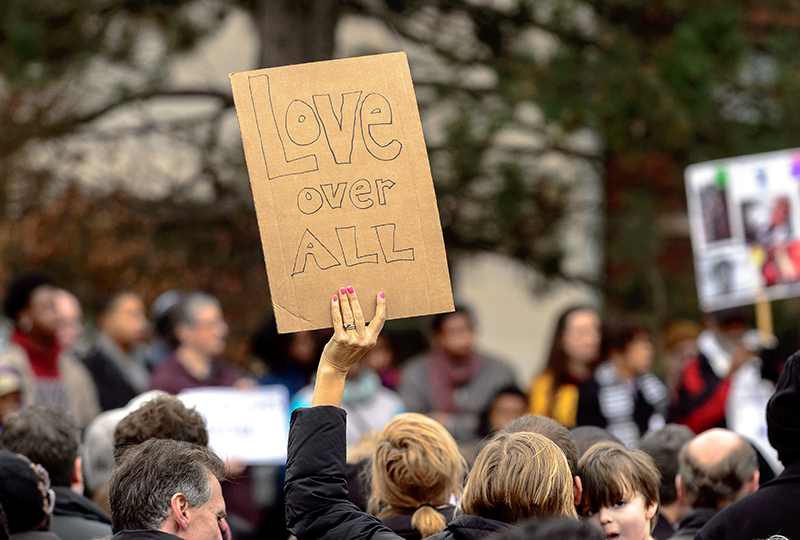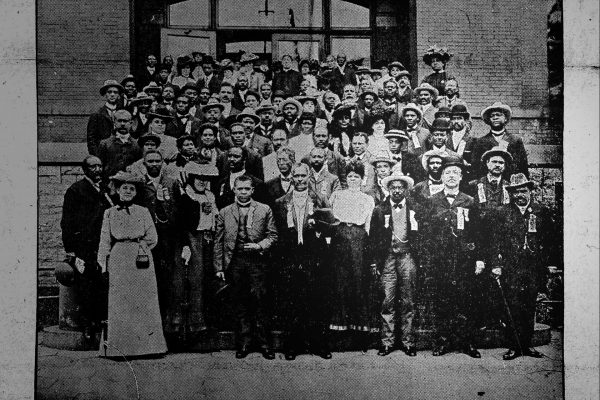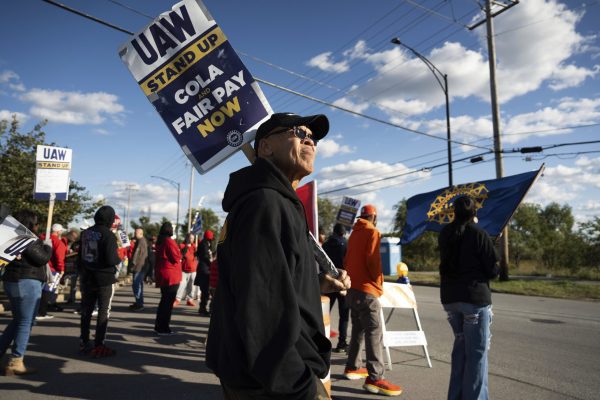I finally said it aloud on a panel at AWP (the annual creative writing conference organized by the Association of Writers & Writing Programs). I don’t remember which city, but I can’t forget the gasp from a fellow panelist, a Native American woman who immediately wanted to rein in my “hostile language.” Meanwhile, the poet sitting next to me, a Palestinian American, gave me a discreet thumbs-up. The entire panel—on addressing whiteness—was made up of poets of color representing various ethnic groups. The presumption was that we would unite our experiences and observations into a collective wisdom.
We become stronger with allies, but we don’t become weaker without them. The ally has the privilege to simply walk away, no harm done to the self, but maybe leaving some damage behind.
But the presentations became more and more tense as we took turns to address one of the moderator’s questions about forging alliances with other groups. It made the assumption that all ethnic groups belonged to a single coalition. I cringed, as if we were supposed to break into song celebrating diversity and solidarity. There were barely audible groans of protest and disagreement on the stage, but we got through the conversation without bloodshed. When it was time for the audience Q&A, however, I unleashed what many had been thinking: that we have to privilege the mission of activism over bonds with outsiders because people of color tend to prioritize healing others’ wounds before their own. This self-harming altruism has, in the long run, distracted from important work at hand and exhausted us.
That pivot played out like this: a young African American woman stood up to tell us that her women’s group, mostly black women, welcomed white allies, who had over the years helped advance the group’s projects. Yet there was this new member, a white woman, who was too vocal at times and assumed the position of power when the group had to make important decisions. When this imposition was addressed or even named, the woman would burst into tears, feeling offended and underappreciated. “What should we do?” the young woman asked our panel in earnest.
I chimed in immediately: “You might have to ask her to leave the group.”
After my copanelist’s disapproving gasp, I elaborated and informed the young woman that tactics like these were not the work of a true ally but of a narcissist intent on replacing any issue on the table with her own emotional needs. “Your group has to ask itself,” I said, “whether it wants to expend its energy in comforting her or protecting the health of all the other members.”
Perhaps the fact that the young woman nodded her head tipped the scales of tolerance from my fellow panelist (and a few members of the audience who glared at me from their seats). I had presented what struck some as a radical solution, but I felt the young woman had likely already considered it. She simply needed affirmation from someone outside who understood what her group was enduring. It wasn’t about getting rid of the weakest link; it was about cutting loose the dead weight.
At the end of the panel, as people scurried to their next event, the young woman stayed behind to thank me—and to apologize for any negative energy directed my way as a result of my answer. “No need to apologize,” I said. “And despite this response, I still believe these panelists are my allies. I can accept disagreement and even pushback. But I will never accept a relationship in which I’m forced to work on the feelings of a single person over my own or my organization’s goals.”
The young woman leaned in to give me a hug and then we both went about our business. The next hour of panels was about to begin.
I should clarify that I don’t go around looking to exclude people. Such decisions should be left to the collective. It’s important to understand how an organization benefits from outsiders and how it might be slowed down by someone—even an insider—who takes up all the air in the room. I learned this from my mother, an undocumented immigrant who worked in a packinghouse for many years.
For the Mexican women in the Coachella Valley of Southern California, an alternative to the backbreaking work in the agricultural fields was backbreaking work in the packinghouses, where harvested dates, corn, and carrots were sorted, boxed, and shipped out to the rest of the country. The hours were long and made longer still when a truck needed to complete a full cargo. The women were expected to remain at work, sometimes past dinnertime. I remember those evenings when the men had to round up all of us children and we shared pizza and liters of soda because our fathers were too tired to cook or didn’t know how.
Workers would complain but only to each other. If anyone dared approach the supervisor, she was simply told not to come back. “Go to the fields,” he threatened. “See how much easier it is there.” At least, that’s how my mother reported it.
The pay was low and there was no overtime. So when the United Farm Workers Union got involved, everyone knew that a strike was likely if negotiations were to fail. This was an ambivalent solution; the undocumented workers, including my mother, feared that the supervisor would simply call the border patrol and have them deported, thereby stomping on the fire of the protest and, more insidiously, breaking up the families of this community. When negotiations did fail, it was time to weigh the positives and the negatives and then put the matter to a vote: to strike or not to strike?
A labor union organizer was making the rounds to discuss this with one group at a time. Since most of the women in the neighborhood worked in the packinghouse, they gathered at the local church that gave mass in Spanish. All of us kids had to tag along. For us it was just another excuse to visit with each other as we squirmed on the uncomfortable wooden folding chairs. I didn’t pay attention to most of the proceedings, but when my mother stood up, I perked up my ears. My mother, usually reserved, gathered the courage to speak out against another member, Carmen, who was not thinking through the options with the others but trying to convince them not to strike, jumping to her feet and arguing bitterly whenever anyone else spoke.
Carmen also happened to be our neighbor, so there was plenty of risk for my mother in doing what many other women couldn’t accomplish: convince Carmen that this was a cause worth fighting for, or at least make her listen for a change. The labor organizer looked exasperated but she was too polite to tell her to calm down. Frustrated as everyone else, my mother quieted the entire room when she addressed the gathering: “Now let’s all decide whether or not we will continue arguing with Carmen.”
Shocked, our neighbor protested immediately. “I have as much of a right to speak as you or anyone else in this room, Avelina. I’m not going to be silenced.”
“But you have been silencing everyone else,” my mother said. “You refuse to listen and you’ve made your position known repeatedly. Unless that position changes, there’s nothing more to your words except noise that’s wearing us out. We need to make a big decision about all our futures, but you’re forcing us to make one about you and only you.”
I can accept disagreement and even pushback. But I will never accept a relationship in which I’m forced to work on the feelings of a single person over my own or my organization’s goals.
The rebuke stung the neighbor, who finally relented and sat down. During and even after the strike, she refused to talk to my mother. But this only proved that my mother had been correct about Carmen, who was turning a group decision into a personal one.
I take my mother’s insight to heart whenever I consider accepting support or advice from any person outside or even inside of my immediate circle: Are they going to help or hinder?
As a Mexican, I have been heartened to see Catholic, Muslim, and Jewish activist groups, in particular, organize and protest immigration policies: the bans, deportations, detentions, and the dreadful caging of minors, children of undocumented border-crossers. These disparate groups may not have been working in conjunction, but their energies and a common adversary have the effect of a dynamic and multivalent movement, empowering others across the spectrum of identities and faiths into action and awareness. Never Again Action—chanting in Yiddish and getting arrested for disrupting ICE activities and speaking out about the United States’ twenty-first-century concentration camps—is one of the clearest and most poignant examples of what makes a true ally: commitment to the greater good.
Allies, after all, can’t hold a movement or organization back, not for any notable period of time. But they can fortify a mission, a goal, and the resolve of a crusade. We become stronger with allies, but we don’t become weaker without them. Let’s not forget: the ally has a privilege that those in the fight may not have—simply to walk away, no harm done to the self, but maybe leaving some damage behind. I hold allies accountable, or I let them go if that is what is needed to redirect the focus back to more pressing tasks. The struggles continue, regardless.
• • •
The current moment does not ask that we abandon the focus of our respective organizations but that we amplify a movement against racial violence and discrimination by standing in solidarity with Black Lives Matter and other anti-racist groups. Systemic racism affects all of us, but blatant acts against African Americans are too commonly committed with impunity and without justice served for the victims and their families. This country has reached a boiling point as evidenced by the global protests and civil unrest, and each response from the sitting president only underscores his unwillingness to address urgent issues such as police brutality. The aggressive tactics employed by state police on peaceful protestors affirm the distrust of authority and send a horrifying message: that it’s going to be a hard-won fight to end the continued dehumanization of black bodies and the disrespect for communities in pain.
This is the summer of reckoning. We each have the option to speak up or remain silent. That is our privilege. One way to transcend that is to consider first those who have no choice. They will be heard, with or without us. They do not need us, but the truth is we need them because the outcome of this critical outcry is going to have a lasting effect on all of our future activist efforts.








